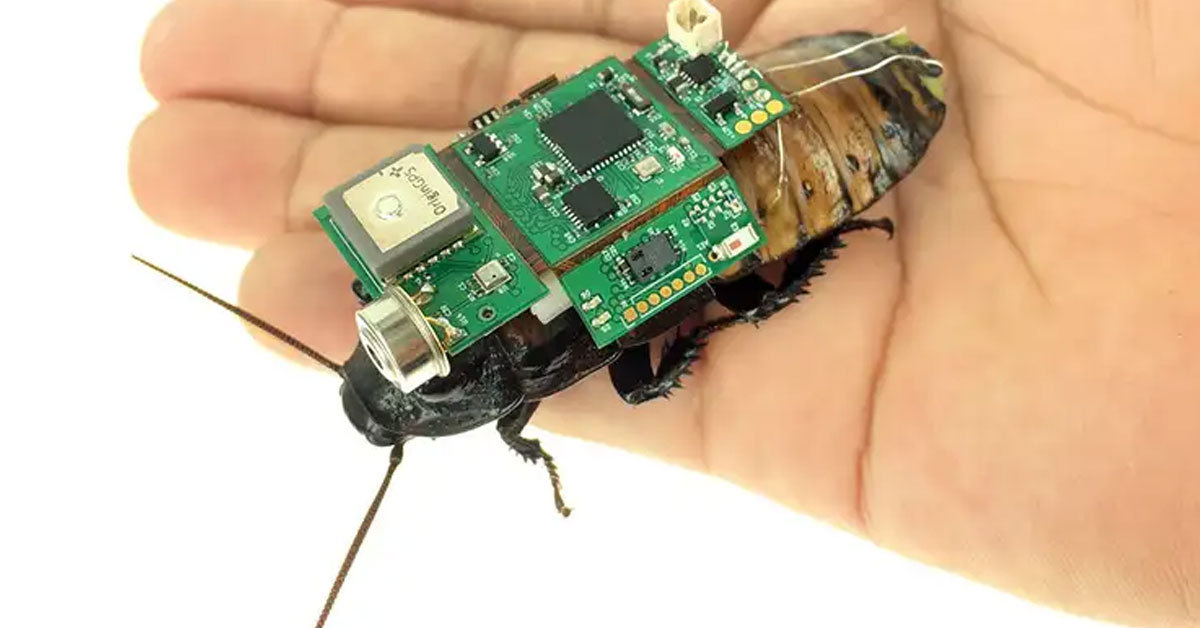If a building had collapsed and you were unfortunate enough to be trapped under all the rubble, the first thing you’d want to see is a person’s face or hand.
The very last thing you’d want to see would be a hissing cockroach.
*shivers*
For hundreds of millions of years, these tiny indestructible slimy beasts have roamed the Earth, searching for food to eat and people to creep out.
Their ability to evade even the most nimble-fingered of humans by escaping through previously non-existent cracks and crevices in our homes has been the bane of our existence for the longest time.
But they could soon use this annoying ability to save lives.
NTU Team Turned Cockroaches into Cyborgs So They Can Enter Disaster Sites
Scientists have been known to conduct all sorts of wacky experiments, some of which pay off.
For NTU Associate Professor Hirotaka Sato and his team, it involved strapping a tiny backpack onto the backs of Madagascar hissing cockroaches.
Prof Sato’s research project, which started four years ago, aims to turn these large insects into cyborgs that can help rescuers locate trapped survivors at disaster sites.
The Madagascar hissing cockroach, once it reaches adulthood, can be as long as 6cm, which is 2cm longer than the local variety. Its bigger size is why the African variety was chosen by Prof Sato and his team.
These cockroaches are equipped with a 5.5g “backpack” with sensors as well as a small infrared camera. The sensors can detect the presence of carbon dioxide, while the camera can use temperature signatures to detect life.
Backpack Controls Movement
Because very few people enjoy holding a live cockroach in their hand, Prof Sato and his team first anaesthetise the insect with carbon dioxide.
They then scrape the wax off the back of the cockroach before attaching two electrodes and a microchip there. A few minutes later, the cockroach will regain consciousness, and not know what the heck just happened.
But once it starts moving around again, a microcomputer in the cockroach’s backpack outputs electrical signals to the neuromuscular sites of the insect.
This means that it’s essentially controlling the cockroach’s movement.
Can Live For Seven Days Without Head
There’s a reason why cockroaches outlived the dinosaur and other prehistoric creatures; they’re tough af.
Madagascar hissing cockroaches can reportedly withstand 10 times more radiation than humans. They can also live up to seven days without their heads, which is around seven days more than a human.
Prof Sato and his team keep over a hundred live cockroaches in containers in a laboratory room in NTU’s School of Mechanical and Aerospace Engineering for their experiments, a room which you couldn’t pay me to visit.
The cockroaches are imported, of course. They take around four months to reach adulthood.
The research is still in its developmental stages, but ultimately, the goal is to release a bunch of these cyborg cockroaches at a disaster site, where they can potentially locate survivors trapped under debris, a task that is difficult and often dangerous for rescuers.
After hundreds of millions of years of making us go “Eek!”, it’s certainly the very least they could do.
It seems that researchers at North Carolina State University had worked on a similar project back in 2012, and even released a video to demonstrate how it works. Have a look:

In the meantime, if you’re wondering why humans have such irrational fears, watch this video to the end:

Read Also:
- 10 Facts About Cockroaches You Didn’t Want to Know
- Everything to Know About the Next 2 Phases of Cross Island Line That’s Just been Revealed
Featured Image: NTU



